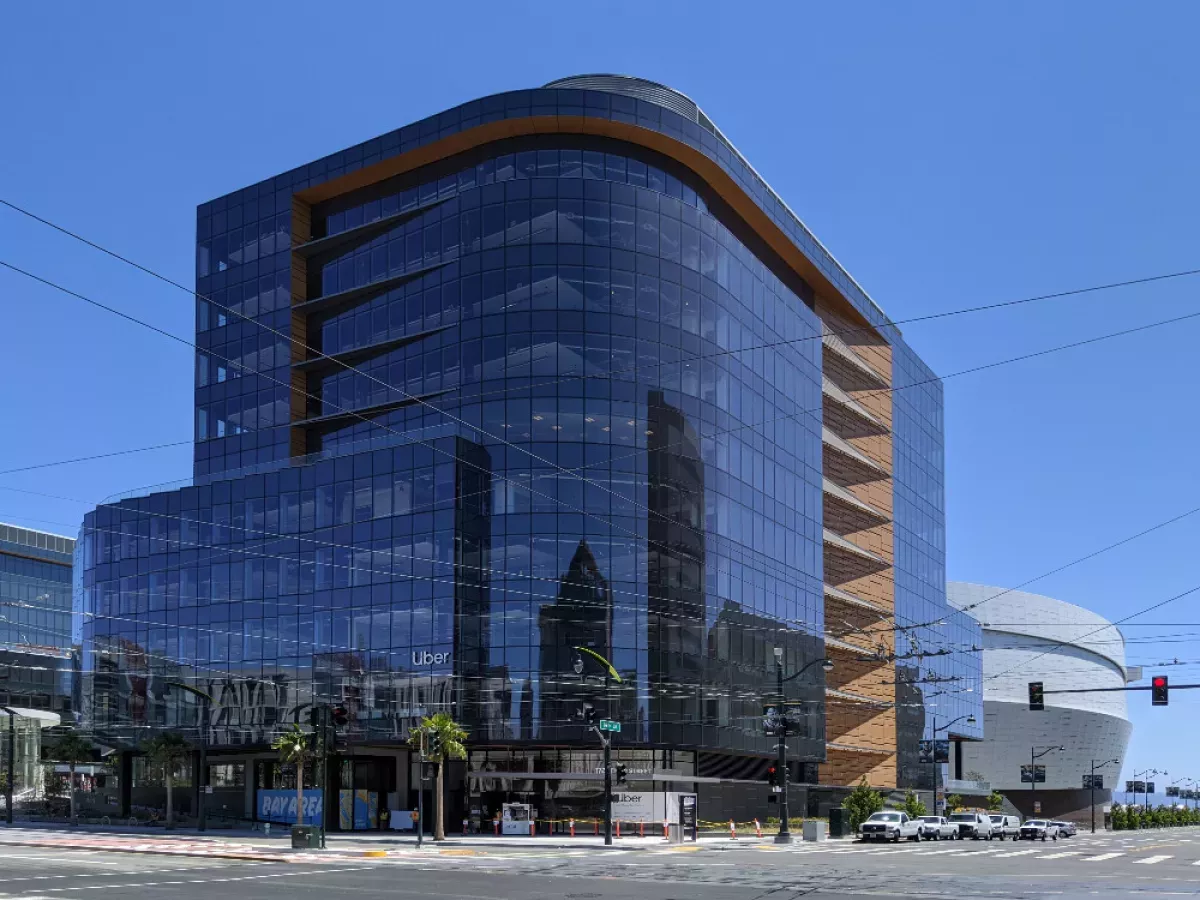Uber Technologies, Inc. is a multinational transportation company headquartered in San Francisco, offering ride-hailing, courier, food delivery, and freight services. Operating in approximately 70 countries and 15,000 cities, it's the largest ridesharing company globally, boasting over 150 million monthly active users and 6 million active drivers and couriers. Uber coordinates around 28 million trips daily, totaling 47 billion since 2010. In 2023, the company's take rate was 28.7% for mobility and 18.3% for food delivery.
2009: Garrett Camp conceives the idea for Uber
In 2009, Garrett Camp conceived the idea for Uber to provide easier and cheaper direct transportation, inspired by difficulties finding taxis and high costs for private drivers.
February 2010: Ryan Graves becomes first Uber employee
In February 2010, Ryan Graves joined Uber as the first employee.
May 2010: Ryan Graves appointed CEO
In May 2010, Ryan Graves was appointed as the Chief Executive Officer (CEO) of Uber.
May 2010: Uber's Beta Launch
In May 2010, Uber launched its services in beta.
December 2010: Travis Kalanick succeeds Ryan Graves as CEO
In December 2010, Travis Kalanick succeeded Ryan Graves as CEO, with Graves transitioning to the role of chief operating officer.
2010: Uber Inception
In 2010, Uber Technologies Inc. was founded. Since its inception in 2010, it has coordinated 47 billion trips.
2010: Studies Show Uber Rides Replace Walking, Bike Rides, and Bus Rides
Studies citing data from 2010 to 2019 found that Uber rides are made in addition to taxi rides, and replace walking, bike rides, and bus rides, in addition to the Uber vehicles having a low average occupancy rate, all of which increases congestion.
2011: Kalanick opposes Wingz
In 2011, Kalanick deemed Wingz, Inc. illegal and contacted authorities to stop regular drivers from giving rides.
2011: Uber Public Launch and Name Change
In 2011, Uber's services and mobile app launched publicly in San Francisco. The company changed its name from UberCab to Uber following complaints from taxicab operators.
April 2012: Uber Launches Service in Chicago
In April 2012, Uber launched a service in Chicago, allowing users to request regular taxis or Uber drivers via its mobile app.
July 2012: Introduction of UberX
In July 2012, Uber introduced UberX, a cheaper option allowing drivers to use non-luxury vehicles with a California Public Utilities commercial license.
2012: Controversial Activities Begin
Between 2012 and 2017, Uber documents revealed attempts to lobby politicians, use of a kill switch during police raids, and disregard for driver safety during protests.
April 2013: Uber copies the ridesharing model
In April 2013, Uber copied Wingz model and added regular drivers with personal vehicles to the UberX platform subject to background checks, insurance, registration, and vehicle standards.
December 2013: UberX Expands to 65 Cities
By December 2013, the UberX service was operating in 65 cities.
December 2013: Uber Named Tech Company of the Year
In December 2013, USA Today named Uber its tech company of the year.
2013: Controversies Begin
Between 2013 and 2017, Uber faced controversies involving unethical practices such as aggressive lobbying and ignoring/evading local regulations.
August 2014: Uber Launches Shared Transport and Uber Eats
In August 2014, Uber launched a shared transport service in the San Francisco Bay Area and also launched Uber Eats, a food delivery service.
September 2014: Uber Discovered Data Leak
In September 2014, Uber discovered a data leak that affected approximately 50,000 drivers, but waited more than five months to notify the affected individuals.
October 2014: Sarah Lacy Accused Uber of Sexism
In October 2014, Sarah Lacy, editor of PandoDaily, accused Uber of sexism and misogyny in its advertising.
2014: Uber Reports Losses
From 2014 until 2022 except for 2018, Uber has posted hundreds of millions or billions of dollars in losses each year.
2014: Uber Starts Operations in China
In 2014, Uber began operations in China under the name 优步 (Yōubù).
2014: Uber's Strategy of Ignoring Local Regulations
In 2014, Uber instructed drivers to ignore local regulations regarding airport pickups in California and stated the company would cover any resulting citations.
February 27, 2015: Uber Admits Data Breach Occurred
On February 27, 2015, Uber admitted that it had suffered a data breach more than nine months prior, disclosing names and license plate information from approximately 50,000 drivers.
March 2015: Khosrowshahi invests in Wingz, Inc.
In March 2015, as CEO of Expedia Group, Dara Khosrowshahi led a multimillion equity investment in Wingz, Inc., the first ridesharing company in the world.
2015: Uber used panic button system Ripley
From spring 2015 until late 2016, Uber allegedly used the panic button system Ripley at least 24 times.
March 2016: Study Finds Uber Rides Reduce Congestion in Los Angeles and Seattle
A study published in March 2016 found that in Los Angeles and Seattle the passenger occupancy for Uber services is higher than that of taxi services, and concluded that Uber rides reduce congestion on the premise that they replace taxi rides.
August 2016: Uber Sells China Operations to DiDi
In August 2016, Uber sold its operations in China to DiDi in exchange for an 18% stake in DiDi, with DiDi investing $1 billion in Uber.
December 2016: Uber Acquires Geometric Intelligence
In December 2016, Uber acquired Geometric Intelligence, forming the core of "Uber AI" for researching AI technologies and machine learning.
2016: Uber used panic button system Ripley
From spring 2015 until late 2016, Uber allegedly used the panic button system Ripley at least 24 times.
2016: Uber Acquires Ottomotto and Faces Lawsuit
In 2016, Uber acquired Ottomotto, a self-driving truck company founded by Anthony Levandowski, for $625 million, later settling a lawsuit regarding the use of stolen trade secrets from Waymo.
2016: Uber Hired Ergo to Investigate Plaintiffs in Class Action Lawsuit
In 2016, Uber hired the global security consulting firm Ergo to secretly investigate plaintiffs involved in a class action lawsuit, with Ergo operatives posing as acquaintances of the plaintiff's counsel to obtain information. The result of which was found out causing the judge to throw out evidence obtained as obtained in a fraudulent manner.
2016: Uber Data Breach Disclosed
In 2016, a data breach disclosed the personal information of 600,000 drivers and 57 million customers, including names, email addresses, phone numbers, and drivers' license information.
2016: Misclassification of Drivers Alleged by Rideshare Drivers United
Rideshare Drivers United in California claim that at least 250,000 individual rideshare drivers in California who drove for the apps between 2016 and 2020 are estimated to be eligible for the settlement for wage theft claims of tens of billions of dollars.
February 19, 2017: Susan Fowler Published Sexual Harassment Claim
On February 19, 2017, former Uber engineer Susan Fowler published on her website that she was propositioned for sex by a manager and subsequently threatened with termination of employment by another manager if she continued to report the incident.
February 27, 2017: Amit Singhal Resigned from Uber
On February 27, 2017, Amit Singhal, Uber's Senior Vice President of Engineering, was forced to resign after he failed to disclose a sexual harassment claim against him that occurred while he served as Vice President of Google Search.
March 2017: Uber Developed "Greyball" Software
In March 2017, The New York Times reported that Uber created a software tool called "Greyball" to evade providing rides to law enforcement in areas where its service was illegal.
June 2017: Uber Fired Over 20 Employees After Investigations
In June 2017, after investigations led by former attorney general Eric Holder and Arianna Huffington, Uber fired over 20 employees, and Kalanick took an indefinite leave of absence, resigning as CEO a week later. Emil Michael, a senior vice president, also departed the company.
July 2017: Study Indicates Uber's Traffic Increase Generates Collective Costs
A study published in July 2017 indicated that the increase in traffic caused by Uber generates collective costs in lost time in congestion, increased pollution, and increased accident risks that can exceed the economy and revenue generated by the service.
July 2017: Uber Received Five-Star Privacy Rating From Electronic Frontier Foundation
In July 2017, Uber received a five-star privacy rating from the Electronic Frontier Foundation.
August 2017: Dara Khosrowshahi Replaces Kalanick as CEO
In August 2017, Dara Khosrowshahi, the former CEO of Expedia Group, replaced Travis Kalanick as CEO of Uber.
September 2017: Transport for London Cites Greyball in License Non-Renewal
In September 2017, Transport for London cited Uber's use of the "Greyball" software as a reason for not renewing Uber's private hire operator license.
September 2017: Uber Criticized for Tracking Customers' Locations
In September 2017, Uber was harshly criticized by the Electronic Frontier Foundation for a controversial policy of tracking customers' locations even after a ride ended, forcing the company to reverse its policy.
November 2017: Uber Disclosed 2016 Data Breach
An announcement in November 2017 revealed that in 2016, a separate data breach had disclosed the personal information of 600,000 drivers and 57 million customers. This data included names, email addresses, phone numbers, and drivers' license information.
2017: Controversial Activities Continue
Between 2012 and 2017, Uber documents revealed attempts to lobby politicians, use of a kill switch during police raids, and disregard for driver safety during protests.
January 2018: Uber Used "Ripley" Panic Button System During Raids
In January 2018, Bloomberg News reported that Uber routinely used a "panic button" system, codenamed "Ripley", that locked, powered off and changed passwords on staff computers when those offices were subjected to government raids. Uber allegedly used this button at least 24 times, from spring 2015 until late 2016.
February 2018: Uber Combines Operations with Yandex Taxi
In February 2018, Uber combined its operations in Russia, Armenia, Azerbaijan, Belarus, Georgia and Kazakhstan with those of Yandex Taxi, investing $225 million in the venture.
March 2018: Uber Merges Services in Southeast Asia with Grab
In March 2018, Uber merged its services in Southeast Asia with those of Grab in exchange for a 27.5% ownership stake in Grab.
May 2018: Uber Rent powered by Getaround Offered
Between May 2018 and November 2018, Uber offered Uber Rent powered by Getaround, a peer-to-peer carsharing service available to some users in San Francisco.
July 2018: Study Finds Uber and Lyft are Creating More Traffic and Congestion
A study published in July 2018 found that Uber and Lyft are creating more traffic and congestion.
August 2018: Uber Agreed to Pay $7 Million to Settle Gender Discrimination Claims
In August 2018, Uber agreed to pay a total of $7 million to settle claims of gender discrimination, harassment, and hostile work environment, with 480 employees and former employees receiving $10,700 each and 56 of those employees and former employees receiving an additional $33,900 each.
September 2018: Uber Paid $148 Million to Settle Data Breach Claims
In September 2018, in the largest multi-state settlement of a data breach, Uber paid $148 million to the Federal Trade Commission, and admitted that internal access to consumers' personal information was closely monitored on an ongoing basis was false.
November 2018: Uber Rent powered by Getaround discontinued
Between May 2018 and November 2018, Uber offered Uber Rent powered by Getaround, a peer-to-peer carsharing service available to some users in San Francisco.
November 2018: Uber Becomes Gold Member of Linux Foundation
In November 2018, Uber became a gold member of the Linux Foundation.
November 2018: Uber Fined by UK Information Commissioner's Office
In November 2018, Uber's British divisions were fined £385,000 (reduced to £308,000) by the Information Commissioner's Office.
2018: Uber Partners with Autzu
In 2018, Uber partnered with Autzu, a San Francisco-based ridesharing company, to offer Uber drivers the opportunity to rent electric Teslas on an hourly basis.
May 10, 2019: Uber Becomes a Public Company
On May 10, 2019, Uber became a public company via an initial public offering.
September 2019: Study Finds Taxis Contribute Less to Congestion and Pollution
A study published in September 2019 found that taxis had lower rider waiting time and vehicle empty driving time, and thus contribute less to congestion and pollution in downtown areas.
October 2019: Uber Acquires Majority Stake in Cornershop
In October 2019, Uber acquired 53% of Cornershop, a provider of grocery delivery services primarily in Latin America.
December 2019: Travis Kalanick Resigned from Uber's Board of Directors
In December 2019, Travis Kalanick resigned from the board of directors of the company and sold his shares.
2019: Uber's Response to California Assembly Bill 5
In 2019, Uber responded to California Assembly Bill 5 by announcing it would not comply with the law and launched a lobbying and public opinion campaign to overturn it, exemplifying its "seek forgiveness rather than permission" strategy.
2019: Uber Announces Layoffs
In the summer of 2019, Uber announced layoffs of 8% of its staff and eliminated the position of COO Barney Harford.
January 2020: Uber Tests Fare Setting Feature
Also in January 2020, Uber tested a feature that enabled drivers at the Santa Barbara, Sacramento, and Palm Springs airports to set fares based on a multiple of Uber's rates.
January 2020: Uber Acquires Careem and Sells Indian Uber Eats
In January 2020, Uber acquired Careem for $3.1 billion and sold its Indian Uber Eats operations to Zomato.
May 2020: Uber AI Shut Down
In May 2020, Uber AI, a division for researching AI technologies and machine learning, was shut down.
May 2020: Uber Announces Layoffs During COVID-19 Pandemic
In May 2020, during the COVID-19 pandemic, Uber announced layoffs of over 14% of its workforce.
June 2020: Uber Manages Fleet for Marin Transit
In June 2020, Uber announced that it would manage the on-demand high-occupancy vehicle fleet for Marin Transit, a public bus agency in Marin County, California, in its first software as a service partnership.
September 2020: Uber Commits to Carbon Neutrality
In September 2020, Uber committed to carbon neutrality globally by 2040, and required that, by 2030, in most countries, rides must be offered exclusively in electric vehicles.
December 2020: Uber Sells Elevate Division
Also in December 2020, Uber sold its Elevate division, which was developing short flights using VTOL aircraft, to Joby Aviation.
December 2020: Uber Acquires Postmates
In December 2020, Uber acquired Postmates for $2.65 billion.
2020: Wage and Hour Claims Filed Against Uber and Lyft
In 2020, 5,000 drivers filed wage and hour claims with the California labour commission office against Uber and Lyft, alleging they were misclassified as independent contractors.
2020: US Department of Justice Announces Criminal Charges Against Joe Sullivan
In 2020, the US Department of Justice announced criminal charges against former Chief Security Officer Joe Sullivan for obstruction of justice related to the 2016 data breach.
January 2021: Uber Sells ATG to Aurora Innovation
In January 2021, Uber Advanced Technologies Group (ATG) was sold to Aurora Innovation for $4 billion in equity, and Uber invested $400 million into Aurora.
March 2021: Uber Moves to New Headquarters
In March 2021, Uber moved to a new headquarters on Third Street in Mission Bay, San Francisco.
June 2021: Uber Acquires Remaining Interest in Cornershop
In June 2021, Uber acquired the remaining 47% interest in Cornershop for 29 million shares of Uber.
October 2021: Uber Acquires Drizly
In October 2021, Uber acquired Drizly, an alcohol delivery service, for $1.1 billion in cash and stock.
2021: Study Finds Ridehailing Can Reduce Air Pollution Costs, But Increases Other Costs
A 2021 study found that shifting private vehicle travel to ridehailing services can reduce air pollution costs, on average, but the increased costs from crash risk, congestion, climate change and noise outweigh these benefits.
January 20, 2022: Uber Acquires Car Next Door
On January 20, 2022, Uber acquired Australian car-sharing company Car Next Door.
July 2022: Uber Files Leak
In July 2022, over 124,000 Uber documents covering 2012-2017 were leaked, revealing controversial activities under Travis Kalanick's leadership, including aggressive lobbying and disregard for driver safety.
September 15, 2022: Uber Discovers Security Breach
On September 15, 2022, Uber discovered a security breach of its internal network by a hacker who gained access through social engineering; the company reported no sensitive data was compromised.
2022: Uber Reports Losses
From 2014 until 2022 except for 2018, Uber has posted hundreds of millions or billions of dollars in losses each year. By the end of 2022, Uber had US$32.11 billion in assets and $24.03 billion in liabilities.
February 2023: Uber Drivers Went on Strike
In February 2023, Uber drivers went on strike in the US and UK to protest wages and fees, and they were joined by drivers from Lyft and DoorDash delivery workers.
2023: Uber's Take Rate in 2023
In 2023, Uber's take rate (revenue as a percentage of gross bookings) was 28.7% for mobility services and 18.3% for food delivery.
2023: Uber Posts Annual Operating Profits
Uber posted annual operating profits in 2023, totaling $1.88 billion, after accumulating $31.5 billion in operating losses since 2014.
January 2024: Uber Fined by Dutch Data Protection Authority
In January 2024, Uber was fined 10 million euros ($11 million) by the Dutch Data Protection Authority for violating privacy regulations pertaining to the personal data of its drivers.
February 2024: Multidistrict Litigation Established Against Uber
In February 2024, a multidistrict litigation (MDL) was established in the Northern District of California against Uber Technologies, Inc., consolidating numerous claims from among the more than 3,000 sexual assault lawsuits filed against the company, alleging Uber prioritized growth over safety.
March 2024: Popular Service Apps Emphasizing Advertising
In March 2024, The Wall Street Journal reported a trend of popular service apps like Uber emphasizing higher margin advertising to increase profits, personalizing content based on user data, and maintaining the balance between increasing ad revenue and annoying and turning away customers.
August 2024: Uber Fined by Dutch Data Protection Authority for GDPR Breach
In August 2024, Uber was fined €290m euros ($324 million) by the Dutch Data Protection Authority for transferring the personal data of European drivers to US servers in breach of the GDPR.
2024: Drizly Shut Down
In October 2021, Uber acquired Drizly, an alcohol delivery service, for $1.1 billion in cash and stock; it was shut down in early 2024.
April 2025: FTC Sued Uber for Deceptive Billing Practices
In April 2025, the Federal Trade Commission (FTC) sued Uber, alleging that it engaged in deceptive billing practices related to the Uber One service, enrolling some customers without consent and making cancellation difficult.
May 2025: Uber's Key Management
Uber's key management as of May 2025 consists of:
2025: Uber's Largest Shareholders
Uber is mainly owned by institutional investors, who hold around 89% of all shares. The 10 largest shareholders in early 2025 were:
2030: Uber's Electric Vehicle Requirement
In September 2020, Uber committed to carbon neutrality globally by 2040, and required that, by 2030, in most countries, rides must be offered exclusively in electric vehicles.
2040: Uber's Carbon Neutrality Target
In September 2020, Uber committed to carbon neutrality globally by 2040, and required that, by 2030, in most countries, rides must be offered exclusively in electric vehicles.
Mentioned in this timeline

Google LLC is a multinational technology company specializing in online...
California is a U S state on the Pacific Coast...
Lyft Inc is a US-based transportation company providing a range...
The Guardian is a British daily newspaper founded in as...

San Francisco is a major commercial financial and cultural hub...
China officially the People's Republic of China PRC is an...
Trending

2 months ago Michael Jordan involved in NASCAR antitrust case; trial threatens NASCAR's structure.

3 months ago Deni Avdija wins in Utah, builds something special in Portland, breaks out for Blazers.

2 months ago Karl-Anthony Towns Expresses Desire to Extend Stay with Knicks Amid Contract Stalls

9 months ago Kelsea Ballerini Shines at ACM Awards with Chase Stokes; Reveals Performance Details.

8 months ago Pascal Siakam Shines in NBA Finals, Inspiring Africa and Sharing Lessons.

9 months ago Knicks and Pacers Clash in Anticipated Eastern Conference Finals, Miller's Legacy Looms.
Popular

Thomas Douglas Homan is an American law enforcement officer who...

William Franklin Graham III commonly known as Franklin Graham is...

Jupiter is the fifth and largest planet from the Sun...

Melania Trump a Slovenian-American former model has served as First...

XXXTentacion born Jahseh Dwayne Ricardo Onfroy was a controversial yet...

Kristi Noem is an American politician who has served as...
